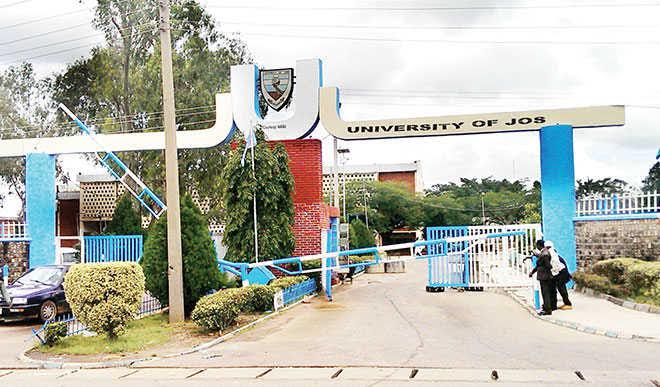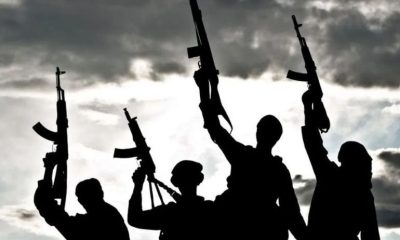News
Securing University of Jos and its Students

By Jide Afolabi
That Nigeria is at war is not in doubt. Educational facilities and students have not been spared in this war. Education itself is in tatters. No Nigerian University, whether public or private ranks among the best 600 in the world according to the Times Higher Education World University Rankings 2019.
Funding for education in Nigeria from elementary to higher education has been abysmal. This was what led to the declaration of the state of emergency in the education sector in 2018.
The National Economic Council presided over by Vice President, Prof Yemi Osinbajo urged governors to declare emergency on education in the 36 states of the Federation. The law teacher turned politician also urged the state and Federal governments to allocate at least 15 percent of their yearly budgets to education with a view to revolutionising the sector.
Unfortunately, the Federal government only allocated 7.02 percent to the Ministry of Education in the 2019 budget against the recommended 15-20 percent budgetary allocation to education by the UNESCO.
The nearly 50 years old University of Jos is not among the best ranked 1000 Universities in the world. This is not the focus now. The focus is on the security of the the school and its students against the background of a series of attacks on the school, the staff and its students.
The University of Jos popularly called UNIJOS was created as a satellite campus of the University of Ibadan in November 1971, admitting its first set of students in January 1972 as pre-degree students. Its Bachelor of Arts degree began in October 1973 and by 1975, the then military dictator, General Murtala Muhammed who was the Head of State established the University of Jos as a separate University and began classes as an independent institution in October 1976 with 575 students spreading over the existing four faculties of Arts and Sciences, Education, Natural Sciences and Medical Sciences.
The institution later added Postgraduate programs in 1977 and by 1978, faculties of Law and Environmental Sciences were established while faculties of Arts and Social Sciences was separated.
The University of Jos has grown from where it began in 1975. Today, it has four campuses and they all appear to be in what the Academic Staff Union of Universities, ASUU, UNIJOS Branch tagged “hostile areas”. The campuses are the Township Campus, Main Campus, Lamingo Campus and the Permanent Site (PS). The immediate communities to these campuses are Angwan Rogo, Angwan Rimi, Kwanan Shagari, Gangare, Angwan Rukuba, and Lamingo/Jarawa. These are very volatile communities in Jos.
Attacks on schools either at elementary, secondary or tertiary are not new in Nigeria. The dreaded terrorist group, Boko Haram gained notoriety for its repeated attacks on schools and universities, as well as teachers, administrators, and students, wreaking havoc on an already fragile education system. Boko Haram has killed an estimated 2, 295 teachers, and over 19, 000 teachers have been displaced by the conflict. The United Nations Children’s Fund, UNICEF, estimates that more than 1, 400 schools have been destroyed, damaged, or looted primarily in the northeast, and more than 600,000 children have lost access to education.
Boko Haram gained international notoriety in 2014 when it abducted 276 girls from their school in the town of Chibok in the terrorists ravaged Borno state. Four years later, more than 100 of the “Chibok girls” were freed after negotiations with the government.
On February 19, 2018, in an attack reminiscent of the 2014 Chibok abductions, Boko Haram abducted 111 girls from the Government Girls Science and Technical College in Dapchi, Yobe state in North Eastern Nigeria.
In addition, the Minister of Education, Mallam Adamu Adamu, said that the Federal Government was concerned over the systematic destruction and targeting of education, adding that over 2, 295 teachers had been killed and 19, 000 others displaced in Borno, Yobe and Adamawa states in the last nine years.
Adamu said, “There is an urgent need to protect education from attacks because, without access to quality learning, the children are not only being deprived of education; they are also being robbed of future opportunities which will affect the entire society.
“We express concern over the systematic destruction and targeting of education, where over 2, 295 teachers have been killed and 19, 000 others displaced in Borno, Yobe and Adamawa states in the last nine years .
“In the same vein, an estimated 1, 500 schools have been destroyed since 2014, with over 1, 280 casualties among teachers and students, thereby devastating the school system.
In May 2014, the twin bomb blast which rocked Jos, the state capital was just a few metres away from the Township Campus of the University of Jos. Not less than 15 students of the University were killed in the attack, including 7 final year Medical students. The Medical Laboratory Science department of the institution is located at the Township Campus. The Old Jos University Teaching Hospital, JUTH, was also affected by the bomb blast. The school management confirmed the deaths on its twitter handle. Over 200 lives were lost in the attack.
The school campuses and its facilities, staff, and students have been severally attacked by ‘unknown gunmen’, alleged herdsmen and other criminal elements. The campuses have been easy targets of the sectarian crises in the state.
In 2009, a student of the institution, Hamza Adamu was shot dead in front of the campus in what was tagged an ‘armed robbery’ incident. Just last year, in September 2018, ‘unidentified uniformed men’ invaded the campus and killed at least two students, with some of the staff of the institution also killed including an official driver of the school. Several others sustained various degrees of injuries.
Hostels and other residences of the students have been under constant attacks and the threat of attacks at slightest misunderstanding should be a serious concern to the management of the institution and government. There have been times when students have to be locked inside the campus because of attacks around the campuses. Students have been shut out of school while it often becomes a problem for students to either attend lectures or leaving the campus to their respective residences because of security concerns.
More of serious concern is the fact that herdsmen are now grazing cattle’s on the campus without any restrictions. This act is not only distracting academic activities but also causing anxiety among members of the University community giving the recent menace posed by Fulani herdsmen in the country.
It is therefore expedient and imperative for the school management and the government to review the Strategic Plan of the institution. The Fourth Cycle Strategic Plan (2015-2019) will expire in 2019 and Centralised Strategic Planning Committee is expected to work on the Fifth Cycle Strategic Plan soon.
The previous strategic plans appear not to have taken into consideration, the issue of security regarding the location of the campuses. The Fifth Cycle Strategic Plan must as a matter of nitty-grity review the previous Strategic Plans.
In the same vein, the management of the University of Jos must as a matter of urgency, overhaul the security system of the institution across the four campuses.
In addition to this, the security team of the institution must have a good working relationship with security agencies in the state. This, the institution can do by establishing an inter-agency consultative forum on UNIJOS security which will comprise all security agencies in the state including military and paramilitary. The committee will be meeting from time to time to review security situations in all the campuses.
The Nigerian government endorsed the Safe School Declaration in May 2015. The programme has not, however, addressed the security threats in Nigerian schools. Government must stop paying lip service to secure our schools especially, schools located in crises prone areas.
Security of lives of students, staff, and facilities of the institution must be seen to be paramount and concerned authorities must put hands together to achieve a safe and secured academic environment.
-

 Opinion5 days ago
Opinion5 days agoDon’t Pull the Plug: Why Nigerians Are Pleading for the U.S. to Extend Its Police Training Program — and Why It Must Synergize With New Military Arrivals
-

 Crime4 days ago
Crime4 days agoVigilante Reportedly Shoots Colleague Dead In Plateau
-

 News3 days ago
News3 days agoRamadan: Osun Cleric Urges Compassion Among Muslims As Asejere Distributes Relief Materials To 537 Beneficiaries
-

 Crime5 days ago
Crime5 days agoMan Shot Dead In Ambush Along Jol-Sho Road In Plateau

